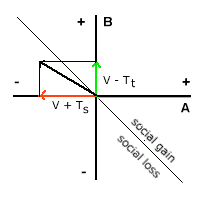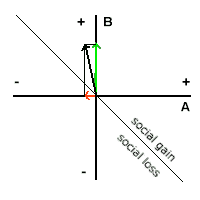
Related:
The hidden costs of theft
 In the case of the theft by B from A of something of value V, A loses V time, and B gains V time. In the case where A gives B the same thing as a gift, exactly the same happens. So in what sense is theft different from gift, if the result is exactly the same? Why should giving gifts be praised, and theft abhorred?
In the case of the theft by B from A of something of value V, A loses V time, and B gains V time. In the case where A gives B the same thing as a gift, exactly the same happens. So in what sense is theft different from gift, if the result is exactly the same? Why should giving gifts be praised, and theft abhorred?
Set out thus baldly, giving is the same as taking, and is a socially neutral act, in that society as a whole neither gains nor loses time. Both giving gifts and stealing are purely redistributive.
But in some important ways, theft and gift are different. Someone who gives someone else a gift knows that the gift has changed hands, and is no longer in their possession. They will not go looking for it in order to use it again. But when the same thing is stolen from someone, they often do not know that it has been stolen until they go looking for it. And searching high and low, they do not find it. And not finding it, their work may be spoiled. A cook who reaches for an implement at some critical moment, only to find it is not there, may end up with an overcooked dish. A carpenter who reaches for a hammer, only to find it gone, may have to abandon everything he is doing.
And even when someone knows that something has been stolen, as for example when someone has a bag snatched from their hands while out shopping, they nevertheless find that, apart from the loss of the contents of the bag, they have also made a wasted journey of some duration.
And furthermore there may be further consequences. If what was bought was something needed for some occasion - a meeting, a dinner -, and the result of the theft is that the occasion cannot proceed, then the consequences of theft may spill over into other people's lives, costing them time also.
Thus, in addition to the value of what has been stolen, there is all the time and trouble that are also consequent upon theft.
And again, from the point of view of the thief, the act of theft is seldom akin to receiving a gift. The thief who snatches a bag must spend time identifying and following his victim, struggling to snatch the bag, and finally running away. The same also goes for bank robbers who make elaborate plans to rob banks, and take careful precautions to avoid arrest. These are all costs to the thief, to be deducted from the value of what he has stolen.
 Thus if the costs to the thief, Tt are subtracted from the value V of the stolen item, and the costs of searching and so forth are added to the victims losses, the result is not a simple resdistribution, but an overall loss to society.
Thus if the costs to the thief, Tt are subtracted from the value V of the stolen item, and the costs of searching and so forth are added to the victims losses, the result is not a simple resdistribution, but an overall loss to society.
Accordingly, theft differs from gift in that there are almost always additional costs, both to the thief and his victim. And as a result, theft is not purely redistributive, but almost always entails an overall loss to society. Society is poorer for theft, in ways it is not for gifts.
No general rule
As a general rule, then, it would appear that acts of theft have adverse consequences for any society, and is not tolerated. However there may be circumstances where theft is the appropriate action to take. If a starving man does not steal a loaf of bread, it may cost him his life, while the loss to his victim is relatively minor. In such a circumstance, the action that has the least worst effect on the society as whole is the appropriate one to take: the starving man should steal the loaf.
And therefore there cannot be an absolute rule that theft is in all circumstances intolerable.
 Another form of theft that may be tolerable might be found in the circumstance where individual A has some useful tool which he no longer uses, and which would be of great value to individual B. If B steals it from A, it is quite likely that A will never notice, and suffer no loss, while B gains the time value of the tool. In this case, society benefits from the theft. However, since the tool is a valuable item, A may have intended to sell it some day, and the theft must count as a loss of the price that could be had for it. Or if A no longer uses a tool, it may simply be that he has not had occasion to use it for some long time, but might have need of it again.
Another form of theft that may be tolerable might be found in the circumstance where individual A has some useful tool which he no longer uses, and which would be of great value to individual B. If B steals it from A, it is quite likely that A will never notice, and suffer no loss, while B gains the time value of the tool. In this case, society benefits from the theft. However, since the tool is a valuable item, A may have intended to sell it some day, and the theft must count as a loss of the price that could be had for it. Or if A no longer uses a tool, it may simply be that he has not had occasion to use it for some long time, but might have need of it again.
Equally, not all gifts are laudable. Everyone has had the experience of receiving gifts that they do not want: the oversize shoes, the undersized bright pink pullover. A blind man has no use for a pair of binoculars, nor a deaf man a radio set. Such gifts only impose upon their recipients the time costs of getting rid of them.
